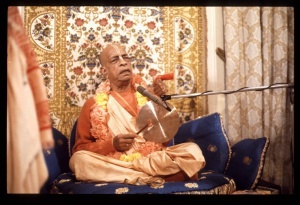CC Madhya 22.146

A.C. Bhaktivedanta Swami Prabhupada
TEXT 146
tasmān mad-bhakti-yuktasya
yogino vai mad-ātmanaḥ
na jñānaṁ na ca vairāgyaṁ
prāyaḥ śreyo bhaved iha
SYNONYMS
tasmāt—therefore; mat-bhakti—in My devotional service; yuktasya—of one who is engaged; yoginaḥ—the first-class yogī or mystic; vai—certainly; mat-ātmanaḥ—whose mind is always engaged in Me; na—not; jñānam—speculative knowledge; na—not; ca—also; vairāgyam—dry renunciation; prāyaḥ—for the most part; śreyaḥ—beneficial; bhavet—would be; iha—in this world.
TRANSLATION
“‘For one who is fully engaged in My devotional service, whose mind is fixed on Me in bhakti-yoga, the path of speculative knowledge and dry renunciation is not very beneficial.’
PURPORT
The path of devotional service is always independent of other activity. The path of speculative knowledge and mystic yoga may be a little beneficial in the beginning, but it cannot be considered part of devotional service. This verse (Śrīmad-Bhāgavatam 11.20.31) was spoken by Lord Kṛṣṇa when He was speaking to Uddhava before His departure from this material world. These are important instructions given directly by Lord Kṛṣṇa. Śrī Uddhava asked the Lord about the two kinds of instructions given in the Vedas. One instruction is called pravṛtti-mārga, and the other is called nivṛtti-mārga. These are directions for enjoying the material world according to regulative principles and then giving up the material world for higher spiritual understanding. Sometimes one does not know whether to practice speculative knowledge and mystic yoga for advancement in spiritual knowledge. Kṛṣṇa explains to Uddhava that the mechanical process of speculative knowledge and yoga is not necessary for advancing in devotional service. Devotional service is completely spiritual; it has nothing to do with material things. It is awakened by hearing and chanting in the association of devotees. Because devotional service is always transcendental, it has nothing to do with material activity.